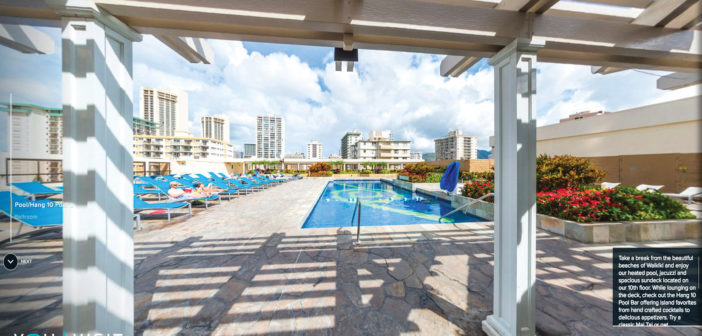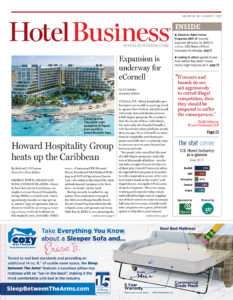HONOLULU—Before guests book their hotels, they visit numerous sites, scour countless reviews and find out absolutely everything they possibly can to ensure they’re making the right choice. But wouldn’t it be nice if guests could choose a hotel feeling like they’ve already been there?
That’s what the Hilton Waikiki Beach on Oahu thought, which is why the property partnered with New York City-based virtual reality (VR) and immersive technology provider YouVisit for a standalone VR app experience for mobile users.
Sandy Narvaez, director of sales and marketing of Hilton Waikiki Beach, noted that Waikiki Beach is going through a growth cycle with several new hotels built or renovated in the past year. “One of the main features of our property that differentiates us is our combination of ocean views and location. We are a block from the beach, which provides our customers with a relaxing atmosphere while avoiding the congestion of the middle of Waikiki. We are also unique in that we provide a full ocean view from the time our guests step in their hotel room doors,” she said. “The VR experience is the best way for us to show our guests the views they can expect before they actually arrive here to the hotel. We specifically wanted to sell our ocean views and differentiate ourselves from new competition.”
Gordon Meyer, director of marketing at YouVisit, added, “The digital revolution has changed the way consumers make travel decisions. With each passing year, those consumers demand a clearer and clearer vision for what they’ll find when they arrive. Virtual reality is the next step in that evolution. VR and interactive 360-degree video goes well beyond pictures and text on a website. The technology enables a potential guest or event planner to truly immerse themselves in an experience and really know what their stay will be like. For hotels, that clarity drives much higher conversion rates than more traditional promotion.”
The hotel’s typical guest is a corporate or government traveler or honeymooners. “Hotel value, location and customer service are the reasons our guests choose to stay with us. The importance of communicating the customer experience before our guests select our hotel is growing,” Narvaez said. “There are so many options that our guests are trying to figure out what really makes us different from the other hotels down the street.”
Enter virtual reality. The mobile app allows visitors to use their smartphones with common headsets like Google Cardboard or Daydream to look around and feel like they’re really in Hawaii. It is also available as a 360-degree tour on desktop—which also offers the ability to book, view a video that highlights the hotel as a wedding destination or read historical background about the hotel’s original namesake, Prince Kuhio—in addition to a fully immersive VR experience on headsets. The tours are currently available in English, Japanese, Korean and Chinese.
“The VR experience allows our guests the freedom to take their own tour,” Narvaez said. “In the past we have used pictures, presentations to customers and videos. The VR has brought our group presentations to a whole new level. Our customers can now see for themselves that our location is a block from the beach is actually a benefit.
“Our guests viewing the 360 tour on a desktop are able to enjoy an actual tour guide that walks them through our hotel,” she continued. “Guests can easily share the links of the tour with their friends and family. Guests viewing the tour on mobile really get an interactive experience. They can look out their balcony to their ocean view, envision their wedding at our garden gazebo, and even experience a reception in our top floor, ocean-view event space, Altitude @ 37.”
“Nobody wants to be surprised on vacation, at least not when it comes to hotel choice,” added Meyer. “By having a more accurate idea of what their stay will be like going in, guests arrive with an immediate feeling of comfort. On the other side of the desk, the hotel staff can rest assured that expectations have been set before their guests reach the property and the relationship will start on the right foot. And unlike the information on OTA sites, these experiences are exclusive to the hotel, so they have access to all customer data. They can remarket and build loyalty effectively, and with full control.”
According to Meyer, creating an experience like this is very much a two-way dialogue. “We start with a series of conversations that get to the heart of what a property most wants to showcase about themselves. Once a shot list has been established, our production team will travel to the site and capture all the footage we need in full 360-degree video,” he said. “We then edit the footage, finalize with the client, and publish to our platform. Through Aria, our proprietary platform, we’re able to make this a pretty turnkey process with a powerful engine running in the background. We can launch in just a matter of weeks. Aria can also incorporate a hotel’s existing 2D assets (i.e. photo and video), so they can get maximum use and value out of what they’ve already created.”
Guest feedback has been positive. “Our customers love it; the first reaction I get is, ‘Cool!’” said Narvaez, noting that she sees an interesting future for VR in hospitality. “I see a virtual tour becoming an expectation just as so many guests browse review sites prior to booking. A referral from a friend or a positive review online is helpful, but with VR guests can experience the hotel for themselves prior to making the investment.”
Meyer, noting that the company’s platform is always evolving, added, “As VR hardware becomes more common in consumers’ homes, the door opens even wider. The possibilities are endless.” HB


